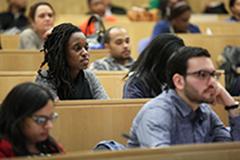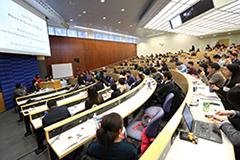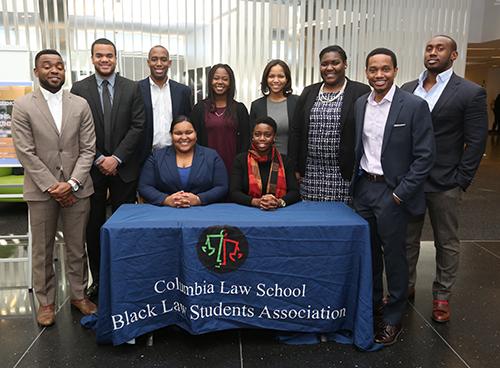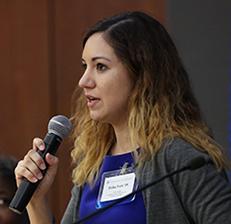Restoring Our Communities
The 2016 Paul Robeson Conference Considered Restorative Justice Practices, Campus Protests, the Effects of Gentrification, and People of Color in the Media
New York, March 9, 2016—Columbia Law School’s 2016 Paul Robeson Conference weighed potential remedies for the fractured associations in many U.S. black communities, including the relationships between citizens and law enforcement or student protesters and university administrators.
The Feb. 27 event, “Troubled Relations: Restoring Our Communities,” was sponsored by the Columbia Black Law Students Association and the Columbia Journal of Race and Law. It brought together legal scholars, public-interest attorneys, government officials, educators, writers, journalists, filmmakers, artists, activists, and media executives.
Panel discussions focused on:
- “Restorative Justice Practices That Rebuild Communities”
- “Restoring Our Campus Communities”
- “People of Color in the Media”
- “Art, Citizenship, and Community”
- “Rapid Change: Gentrification and Communities of Color”
Black Law Students Association Board |
| Erika Vera '16, Editor-in-Chief of the Columbia Journal of Race and Law, addresses conference attendees. |
Now in its second decade, the annual Robeson Conference celebrates the life of Paul Robeson ’23 as notable speakers consider solutions to America’s enduring racial divide. One of Columbia Law School’s most respected alumni, Robeson dedicated his life to excellence in scholarship, civil rights, athletics, and the performing arts.
In addition to organizing the daylong conference, earlier in the week, BLSA held its annual gala to honor former Columbia Law professor and civil rights advocate Theodore Shaw ’79.
Featured conference speakers included:
- Reni Benson ’17, president of the Columbia Black Law Students Association
- Rich Blint, associate director, office of community outreach and education, Columbia University School of the Arts
- Brandon Frame, founder of The Black Man Can
- Richard Gray, director of community organizing and engagement, Annenberg Institute for School Reform at Brown University
- Rose Hackman, features writer, The Guardian
- Avis E. Hinkson, dean, Barnard College
- Janice Tudy Jackson ’92, conflict management consultant and lecturer-in-law at Columbia Law School;
- Daniel Klimek, actor, director, producer, co-owner of Happy Man Film, Inc.
- David Lat, founder and managing editor of Above the Law
- Oscar Lopez ’13, staff attorney, Ending the Schoolhouse to Jailhouse Track program at the Advancement Project
- beluvid ola-jendai, poet
- Runa Rajagopal, director of civil practice, The Bronx Defenders
- Reinaldo Rivera, Jr., national program manager of the U.S. Justice Department's Community Relations Service
- Stephanie Rudolph, staff attorney for the Urban Justice Center’s Community Development Project
- Marcia Lynn Sells ’84, dean of students, Harvard Law School
- Whitney Slaten, Ph.D. candidate in ethnomusicology at Columbia University
- Glenda Smiley, associate director, Black Girls Rock!
- Christopher Stahling, Harlem resident, former BNY Mellon Pre-Professional
- Jasmine Sudarkasa, artist, training and technical assistance coordinator at Girls Educational and Mentoring Services
- Kendall Thomas, Nash Professor of Law and director of the Center for the Study of Law and Culture at Columbia Law School
- Erika Vera, Editor-in-Chief of the Columbia Journal of Race and Law
- Lt. Mark Turner, commanding officer of special projects, NYPD Training Bureau
- Bené Viera, multimedia journalist
- Christopher Wilds ’15, Herbert and Nell Singer Social Justice Fellow at the NAACP Legal Defense Fund
- Anne Williams-Isom ’91, chief executive officer, Harlem Children’s Zone



